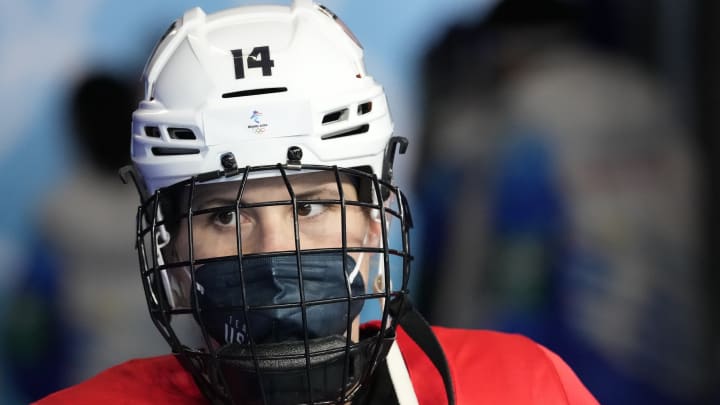Brianna Decker Continues to Lead the U.S. Women’s Hockey Team at the Olympics

BEIJING — When Brianna Decker went down during the first period of the U.S. women’s hockey team’s first game at the 2022 Winter Olympics, suffering a broken left fibula and several torn ankle ligaments in a gruesome fall against Finland, the defending gold medalists lost their alternate captain and star center for the rest of the tournament. But they also gained a coach.
“We call her Coach Decks now,” forward Abby Roque says, “because she’s got a new role helping out with everything we need, just being a voice to us all, telling us what maybe she sees in the stands and just amping us up. She really has still had such an impact on this team.”
Coach Decks is not some rookie in this regard, either. In addition to working various youth hockey camps over the past decade, the 30-year-old served as an assistant on the American bench at the 2019 under-18 world championships in Japan, where her bright-eyed pupils included current U.S. defender Caroline Harvey. “She expects a lot out of you,” Harvey, 19, says. “But she's definitely still as intense of a coach as she is as a player. She goes hard.”
The scene of Decker sprawled on the ice in pain was wrenching, compounded by the sounds of her screams echoing throughout a near-empty Wukesong Sports Centre. “When I got to rewatch on the iPad on the bench, I wanted to throw up basically for the whole first period after that,” Roque says. But almost as soon as the stretcher hauled her away, Decker’s mind turned to her teammates. That’s why she was waiting on crutches to congratulate them after a 5-2 victory—and why she decided against returning stateside for surgery to stay in Beijing.
“It just shows how much she means to this team, and her leadership capabilities, and how she’s able to still lead through some of the darkest times of her personal life,” captain Kendall Coyne Schofield says. “She’s an incredible person and an incredible player and her presence is definitely still felt and appreciated, and her leadership, it shines through each game we play.”
This includes the regular games of euchre, a trick-taking team card game, that Decker and Roque play against fellow forwards Amanda Kessel and Alex Carpenter in the Olympic Village. (“I think we’re just getting bad luck,” Roque laments. “We make all the right calls, we just can’t get a good hand.”) Then again if Decker had her druthers she would be at the rink day and night watching her teammates skate. “That’s the best for me,” she says. “I want to be around.”
Processing the damage has been a difficult mental process, especially because her third Olympics were less than 10 minutes old when it occurred. “A lot needs to set in,” she says. But she has also been lifted by a groundswell of support from teammates, opponents and beyond. “[U.S. speedskater] Brittany Bowe has been great,” Decker says. “And then I talked to Nina O’Brien,” the American alpine skier who broke her leg in the giant slalom. "We were chatting a bit back and forth, and just checking in with each other, so that's been nice.”
Coach Decks takes a similar approach with her teammates, watching games from the stands and then popping into the locker room to offer her perspective. “She’s got respect in the locker room that I don’t have, because she’s walked through the fire with those guys,” head coach Joel Johnson says. “When she says stuff, it means something in a different context, it means it with a different influence than it does when any of our coaching staff shares it.” Johnson also solicits Decker’s opinion on matters ranging from days off to the roster’s general mood. “We’re certainly taking advantage of a tough situation by including her as much as we can,” he says.
One such moment came in the wake of last week's preliminary-round loss to Canada, when the U.S. outshot its rivals 53-27 but only beat goalie Ann-Renée Desbiens twice. “I think it was pretty reassuring to all of us exactly how she was talking about the game, and how great we looked,” says Roque, who has stepped into Decker’s second-line role centering Carpenter and Kessel. “She’s great, personable, pretty inspiring and can get on you when she has to.”
Of course, her teammates would prefer that she could simply shed her cast and hop back on the ice, if not for Monday’s semifinal rematch with Finland, then for the gold medal game against Canada that everyone assumes will follow. “I don't think anyone can fill Brianna Decker’s shoes,” Roque says. “No one can really do Brianna Decker like she does.”
But, like Johnson said, they are making the best of the circumstances: When Decker recently ditched her crutches and switched to a knee scooter, her subsequent entrance into the U.S. locker room was commemorated by someone putting Chamillionaire’s “Ridin’ ”—They see me rollin’…they hatin’…patrolling and tryin’ to catch me ridin’ dirty…—over the speaker system.
“Look at some of the athletes who are getting injured at the Olympics,” Decker says. “Their tournaments are over. Fortunately, I can still have an influence in the locker room, as far as helping them out on the power plays, being an eye in the sky, making sure I can give them certain tips here and there to help them look at the game a little different.”
Spoken like a true coach.
More Olympics Coverage:
